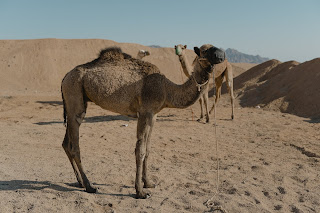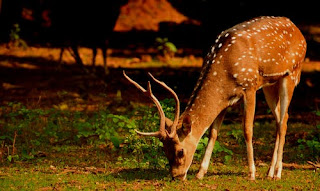 |
| Domestic Animals Vocabulary |
COW (গাই / গাভী)
Example: The most ordinary domestic animal is cow that is used as draft animals and also for their dairy and meat products.
 |
| Cow |
OX ( বলদ / দামড়া / ষাড়)
Example: In Australia and India, ox is known as bullock and used for several purposes like plowing, threshing etc.
 |
| Ox |
BULL (ষাড় / বৃষ)
Example: The main difference between ox and bull is that the ox is a common bovine draft animal and bull is a male individual of cattle.
 |
| Bull |
ZEBU (কুঁজওয়ালা ষাড়)
Example: Zebu cattle have a hump above their shoulders.
 |
| Zebu |
LLAMA (লামা)
Example: The llama is a South American relative of the camel, though the llama does not have a hump.
 |
| Llama |
GOAT (ছাগল)
Example: While the goat was eating the leaves of the sapling, Sam got angry and caught it.
 |
| Goat |
YAK (তিব্বতি গাই / চমরি গাই)
Example: Yaks are heavily fringed with long black hair and in China, they are known as “hairy cattle”.
 |
| Yak |
BUFFALO (মহিষ)
Example: Is there any difference between a buffalo and a bison?
 |
| Buffalo |
WATER BUFFALO (মোষ)
Example: Water buffalo prefer to feed in grasslands on grass and herbs and the most interesting thing is they spend much of their day in the muddy waters.
 |
| Water Buffalo |
DONKEY (গাধা)
Example: Tom has donkeys who share the ponies paddock near the farm.
 |
| Donkey |
MULE (খচ্চর)
Example: Do you know why mules are sterile?
 |
| Mule |
HORSE (ঘোড়া)
Example: Raisa asked her father, “Why do horses nap while standing?”
 |
| Horse |
CAMEL (উট)
Example: I was quite surprised, when I get to know about the fact that camels can go up to seven months in the desert without drinking water.
 |
| Camel |
SHEEP (ভেড়া)
Example: The plural form of sheep is also sheep, though in rare, nonstandard contexts, the plural form can also be sheeps.
 |
| Sheep |
ALPACA (আলপাকা)
Example: The most-noticeable difference between alpaca and llama is their sizes and their faces are also dissimilar.
 |
| Alpaca |
RABBIT (খরগোশ)
Example: I have three rabbits in my home those colors are quite different from each other, first one is black, second one is mixed of brown and white and the third one is completely white.
 |
| Rabbit |
PIG (শূকর)
Example: Among all the domesticated animals, pigs are the smartest animals and they are even smarter than dogs.
 |
| Pig |
DUCK (পাঁতিহাস)
Example: The ducks are playing in the pond water.
 |
| Duck |
CHICKENS (মুরগি)
Example: I am accustomed to eating chicken eggs every morning.
 |
| Chickens |
GOOSE (রাজহংসী)
Example: Suddenly, the goose saw me, when I was passing through near the pond and it started to cackle loudly.
 |
| Goose |
DOVE (ঘুঘু)
Example: When shaila walked into the yard, there were two doves those were cooing.
 |
| Dove |
PIGEON (কবুতর)
Example: Saima has five dozen pigeons in their house.
 |
| pigeon |
DEER (হরিণ)
Example: The deer in the forest are all dying of from a disease that has not identified yet.
 |
| Deer |
FISH (মাছ)
Example: Today I have caught 1.5 kg fishes from our pond.
 |
| Fish |
TURKEY (তুর্কি মোরগ)
Example: Turkey is a large domesticated bird and they provide popular and nutritious food for humans that is rich in protein, vitamin B and niacin.
 |
| Turkey |
GUINEA FOWL (চিনা মোরগ / মুরগি)
Example: Guinea fowl do a great job of keeping the snake away because they are good snake deterrent.
 |
| Guinea Fowl |
GUINEA PIG (গিনিপিগ)
Example: guinea pig is a domesticated animal that eats vegetation and if supplied with enough moist food, then do not require water to drink.
 |
| Guinea Pig |
WETHER (খাসি)
Example: Though these three words, “ wether, whether and weather” sounds same when you say them, their meaning are completely different from each other such as, weather is the state of the natural environment in a place at a particular time whereas wether is a male sheep or goat.
 |
| Wether |






Great content.. Learn lots of english name
ReplyDeleteThank you Anamika for sharing the grateful information. Keep going.
ReplyDeleteMasha allah keep going
ReplyDelete